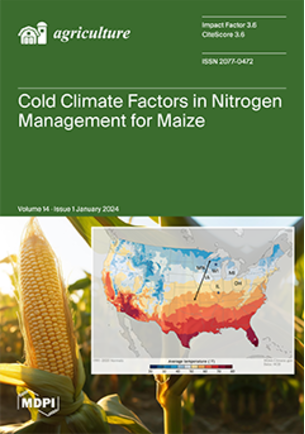Biological Control Options for the Management of Tadpole Shrimp (Triops longicaudatus (LeConte)) in California Rice
Q2 Agricultural and Biological Sciences
引用次数: 0
Abstract
Tadpole shrimp (Triops longicaudatus) has become a major pest for California rice farmers. Currently, management relies solely on the insecticide lambda-cyhalothrin. However, resistance to this pyrethroid was confirmed in 2016; thus, identifying an effective and practical biological control method for TPS is a priority. Field trials were conducted from 2017 to 2018 to (1) evaluate the efficacy of the predatory fish Gambusia affinis and the predatory beetles, Laccophilus maculosus (Say) and Tropisternus lateralis (Fabricius), in controlling TPS, (2) test the efficacy of several inoculation rates of Gambusia affinis at controlling TPS and (3) to explore early indicators of TPS activity and damage as monitoring tools. Both Gambusia affinis and the predatory beetle treatments were not significantly different from the commercial standard (lambda-cyhalothrin). Both four and five Gambusia per 1 m2 controlled TPS as well as lambda-cyhalothrin, and we observed that Gambusia affinis was able to reproduce in the field. Water turbidity was significantly correlated with TPS counts (R = 0.85, N = 20, p < 0.0001 (2017); R = 0.58, N = 30, p = 0.0007 (2018)). The number of dislodged seedlings was less reliably correlated with TPS count; in 2017, correlations were significant (R = 0.84, N = 20, p < 0.0001); however, in 2018, correlations were not significant (R = 0.18, N = 30, p = 0.35). With further refinement, water turbidity could play a valuable role in monitoring TPS populations.加利福尼亚水稻中蝌蚪虾(Triops longicaudatus (LeConte))的生物防治方案
蝌蚪虾(Triops longicaudatus)已成为加州稻农的主要害虫。目前,治理工作完全依赖于杀虫剂溴氰菊酯。然而,2016 年证实了对这种拟除虫菊酯的抗药性;因此,确定一种有效实用的生物防治方法来防治蝌蚪虾是当务之急。2017 年至 2018 年期间进行了实地试验:(1)评估捕食性鱼类 Gambusia affinis 和捕食性甲虫 Laccophilus maculosus(Say)和 Tropisternus lateralis(Fabricius)在控制 TPS 方面的功效;(2)测试 Gambusia affinis 的几种接种率在控制 TPS 方面的功效;(3)探索 TPS 活动和损害的早期指标作为监测工具。Gambusia affinis 和捕食甲虫处理与商业标准(高效氯氟氰菊酯)没有显著差异。每 1 平方米四只和五只 Gambusia 与高效氯氟氰菊酯一样能控制 TPS,而且我们观察到 Gambusia affinis 能够在田间繁殖。水体浑浊度与 TPS 数量明显相关(R = 0.85,N = 20,p < 0.0001(2017 年);R = 0.58,N = 30,p = 0.0007(2018 年))。脱落幼苗数量与 TPS 计数的相关性不太可靠;2017 年,相关性显著(R = 0.84,N = 20,p < 0.0001);但 2018 年,相关性不显著(R = 0.18,N = 30,p = 0.35)。随着进一步完善,水体浑浊度可在监测 TPS 种群方面发挥重要作用。
本文章由计算机程序翻译,如有差异,请以英文原文为准。
求助全文
约1分钟内获得全文
求助全文
来源期刊

Agriculture
Agricultural and Biological Sciences-Horticulture
CiteScore
1.90
自引率
0.00%
发文量
4
审稿时长
11 weeks
期刊介绍:
The Agriculture (Poľnohospodárstvo) is a peer-reviewed international journal that publishes mainly original research papers. The journal examines various aspects of research and is devoted to the publication of papers dealing with the following subjects: plant nutrition, protection, breeding, genetics and biotechnology, quality of plant products, grassland, mountain agriculture and environment, soil science and conservation, mechanization and economics of plant production and other spheres of plant science. Journal is published 4 times per year.
 求助内容:
求助内容: 应助结果提醒方式:
应助结果提醒方式:


